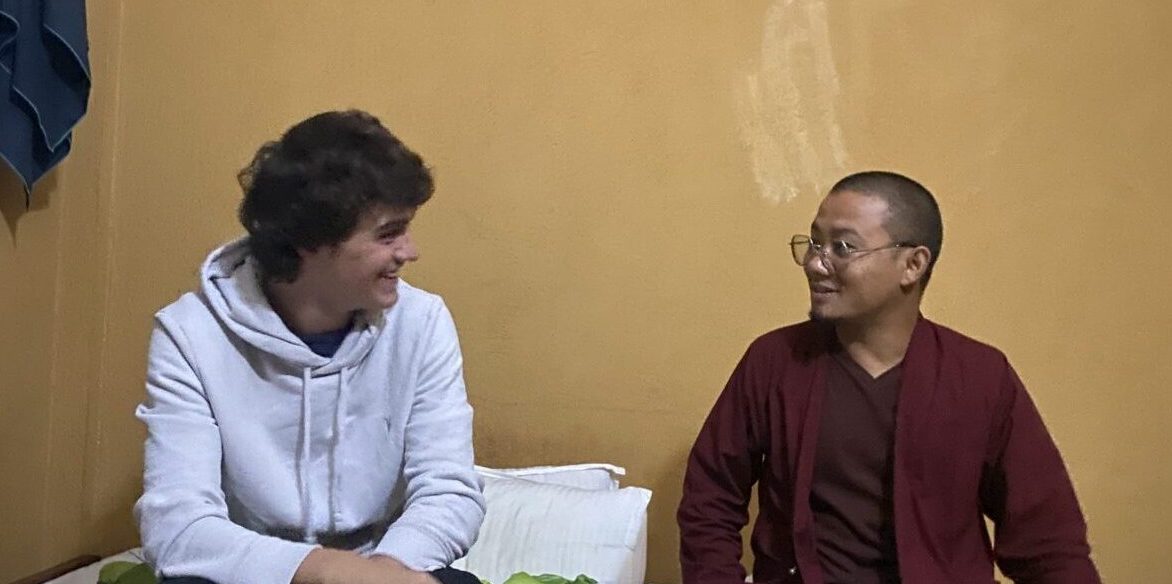Three weeks in Nepal: life reflections with my Buddhist monk friend
Over the summer, I spent three weeks in a Buddhist monastery on the outskirts of Kathmandu in Nepal to do voluntary work. I was teaching young monks from the ages of 7 to 18 different levels of English. My daily routine consisted of waking up at 4:50am for the hourly prayer happening at 5, during which I would meditate. Breakfast was at 6 and then I would teach from 7 to 10am. After that, I had specific lunch and dinner periods, but was mostly free throughout the day. During this time, I would read, play games with the kids, meditate, reflect, and have conversations with the different monks.
The “small” interview turned into a deep conversation with a man who — as I only then came to realize — had become a close friend of mine
On my final night, I asked the head of the monastery, Sange, if I could interview him. Sange is in his early thirties, loves Hollywood movies — particularly those starring Dwayne, “The Rock” Johnson and Kevin Hart —, randomly bursts out singing without shame on public transport, and is probably the wisest person I’ve ever had the privilege of talking to. The “small” interview turned into a deep conversation with a man who — as I only then came to realize — had become a close friend of mine thanks to the strong bond of brotherhood I had formed by living with the monks, even if just for a short period.
Sange is one of the few monks in the monastery who actively decided to become a monk at an extremely young age, at the time because he “thought the clothes looked cool”. Today, he affirms: “I can confidently say that I have a strong faith in my religion, I have realized what the meaning of Buddhism is. I have been reading the books of Buddha’s teachings for 16 years now.” For Sange, Buddhism means trying to do as much good as possible. During our conversation, he quoted one of his greatest role models, Abdul Kalam, a scientist and former President of India, who said: “I’m not a handsome guy but I can give my hand to someone who needs help. Beauty is in the heart, not in the face.”
We also discussed the problems of the world, which for Sange go back to the lack of attention to our inner selves, with us focusing too much on the outside but not on our inside. He explained how “love means responsibility: if you have a responsibility for yourself then you can take responsibility for others, that is enough.”
A crucial concept in Buddhism is enlightenment. Although Sange doesn’t know anyone who has been enlightened recently, he remains optimistic that it will happen to him in this lifetime
In his view, our generation’s immense suffering from anxiety and depression is of our own making, turning small things into huge problems inside our own minds–– controlling one’s mind is a fundamental aspect of reaching peace. Sange believes that we care too much what people think of us, and that there are always going to be people who don’t like us — this is true even for him, as despite being the selected head of the monastery, some monks still have problems with him. According to him, “you can’t make everyone happy, but you can try to help.” A crucial concept in Buddhism is enlightenment. Although Sange doesn’t know anyone who has been enlightened recently, he remains optimistic that it will happen to him in this lifetime.
A topic much discussed during my stay in the monastery was emptiness. Sange explained: “Emptiness means that when you analyze something, in the end you’re not going to find that reality. We are holding a self, we always speak of “me” and “you”, but what is self? Once you engage in introspection, there is no self in your body anymore. It just exists because of our diligence, because we perceive it, but it’s not reality. In Buddhism, this is called emptiness: when you embrace the emptiness, your negative feelings, such as desire, anger, or ignorance, will vanish. Emptiness means stripping away the sense of self.”
On my tearful last day, we reflected on all the memories I was taking with me from this trip, from playing football with the monks, trekking in the jungle in the middle of monsoon season, and teaching and playing with the amazing kids, to having late night talks with my monk brothers and walking out with a new lens through which to see the world. While I still have a journey within myself to discipline my mind and embrace the many lessons that I’ve learned in my time in Nepal, I would strongly encourage others to embark on a similar experience, challenging their existing mindset and beliefs.

Comments